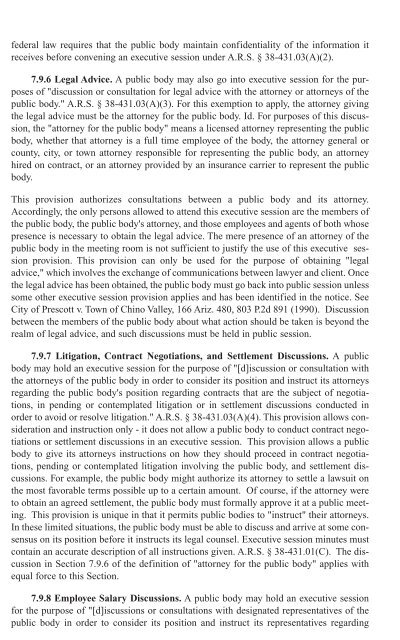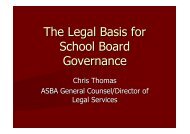The Arizona Open Meeting Law - Arizona School Boards Association
The Arizona Open Meeting Law - Arizona School Boards Association
The Arizona Open Meeting Law - Arizona School Boards Association
You also want an ePaper? Increase the reach of your titles
YUMPU automatically turns print PDFs into web optimized ePapers that Google loves.
federal law requires that the public body maintain confidentiality of the information it<br />
receives before convening an executive session under A.R.S. § 38-431.03(A)(2).<br />
7.9.6 Legal Advice. A public body may also go into executive session for the purposes<br />
of "discussion or consultation for legal advice with the attorney or attorneys of the<br />
public body." A.R.S. § 38-431.03(A)(3). For this exemption to apply, the attorney giving<br />
the legal advice must be the attorney for the public body. Id. For purposes of this discussion,<br />
the "attorney for the public body" means a licensed attorney representing the public<br />
body, whether that attorney is a full time employee of the body, the attorney general or<br />
county, city, or town attorney responsible for representing the public body, an attorney<br />
hired on contract, or an attorney provided by an insurance carrier to represent the public<br />
body.<br />
This provision authorizes consultations between a public body and its attorney.<br />
Accordingly, the only persons allowed to attend this executive session are the members of<br />
the public body, the public body's attorney, and those employees and agents of both whose<br />
presence is necessary to obtain the legal advice. <strong>The</strong> mere presence of an attorney of the<br />
public body in the meeting room is not sufficient to justify the use of this executive session<br />
provision. This provision can only be used for the purpose of obtaining "legal<br />
advice," which involves the exchange of communications between lawyer and client. Once<br />
the legal advice has been obtained, the public body must go back into public session unless<br />
some other executive session provision applies and has been identified in the notice. See<br />
City of Prescott v. Town of Chino Valley, 166 Ariz. 480, 803 P.2d 891 (1990). Discussion<br />
between the members of the public body about what action should be taken is beyond the<br />
realm of legal advice, and such discussions must be held in public session.<br />
7.9.7 Litigation, Contract Negotiations, and Settlement Discussions. A public<br />
body may hold an executive session for the purpose of "[d]iscussion or consultation with<br />
the attorneys of the public body in order to consider its position and instruct its attorneys<br />
regarding the public body's position regarding contracts that are the subject of negotiations,<br />
in pending or contemplated litigation or in settlement discussions conducted in<br />
order to avoid or resolve litigation." A.R.S. § 38-431.03(A)(4). This provision allows consideration<br />
and instruction only - it does not allow a public body to conduct contract negotiations<br />
or settlement discussions in an executive session. This provision allows a public<br />
body to give its attorneys instructions on how they should proceed in contract negotiations,<br />
pending or contemplated litigation involving the public body, and settlement discussions.<br />
For example, the public body might authorize its attorney to settle a lawsuit on<br />
the most favorable terms possible up to a certain amount. Of course, if the attorney were<br />
to obtain an agreed settlement, the public body must formally approve it at a public meeting.<br />
This provision is unique in that it permits public bodies to "instruct" their attorneys.<br />
In these limited situations, the public body must be able to discuss and arrive at some consensus<br />
on its position before it instructs its legal counsel. Executive session minutes must<br />
contain an accurate description of all instructions given. A.R.S. § 38-431.01(C). <strong>The</strong> discussion<br />
in Section 7.9.6 of the definition of "attorney for the public body" applies with<br />
equal force to this Section.<br />
7.9.8 Employee Salary Discussions. A public body may hold an executive session<br />
for the purpose of "[d]iscussions or consultations with designated representatives of the<br />
public body in order to consider its position and instruct its representatives regarding<br />
- 35 -



